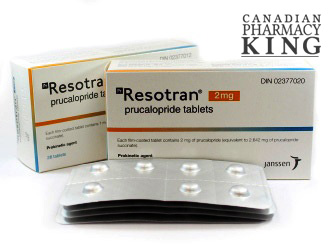
Resotran is used for the treatment of chronic constipation in adult females when laxatives do not provide adequate relief. Resotran increases the frequency of bowel movements to provide a feeling of complete evacuation by stimulating peristalsis, the muscular contractions of the gut needed for bowel movements. Take Resotran exactly as prescribed by your doctor. For adults, the usual recommended dosage is 2 mg once daily. For elderly, the dosage is 1 mg once daily. Do not exceed a dosage of 2 mg per day. This will not add to the relief of constipation. If there is no bowel movement in 3-4 days, contact your doctor. Your doctor may recommend an additional appropriate medication (e.g., laxative) for relief of immediate, acute constipation, at the same time as ongoing Resotran treatment.
In another study (Prucalopride: a review of its use in the management of chronic constipation - 2013), Gillian M. Keating, found that "prucalopride is an important option for use in patients with chronic constipation who have not experienced adequate relief with laxatives".
Manufacturer Information
Resotran is manufactured by Janssen Inc. and comes from Canada. The active ingredient in Resotran is Prucalopride Succinate. The generic Prucalopride Succinate is available from Canada and India. It is available as tablets in the dosage forms of 1 mg and 2 mg.
Stop taking Resotran and call your doctor at once if you have one of these serious side effects:
• Chest pain
• Severe or persistent bloody diarrhea
• Strong or irregular or racing heartbeat
• Unusual changes in mood or behaviour
Less serious side effects include headache, stomach pain, nausea, passing gas, enlargement of the abdomen or stomach, upset stomach, dizziness, tiredness, back pain, sinusitis, and kidney urinary disorders and diarrhea. Please call your doctor if you have any further concerns or questions.
If you experience dizziness or tiredness while taking Resotran, use caution while driving or operating machinery. Do not take Resotran if you are allergic to are allergic to Prucalopride Succinate, or any of the other ingredients in Resotran, need dialysis, have serious problems with your gut like blockages, holes in your intestine, Crohn’s disease or ulcerative colitis, have a rare hereditary problem of galactose intolerance, Lapp deficiency or glucose/galactose malabsorption as the medication contains lactose. Resotran may interact with antibiotics like erythromycin and ketoconazole, atropine-like substances.
• Where can I buy Resotran?
You can buy Resotran online from our certified Canadian Pharmacy, or by email (CustomerService@canadianpharmacyking.com), by phone (1-877-745-9217), or by fax or mail.
• Is there a generic version of Resotran available?
Yes, a generic version of Resotran is available from Canada. You can call our customer support for details.
• Are there any discounts or coupons for Resotran?
Unfortunately, there are no discounts or coupons available for Resotran However, Canadian Pharmacy King is proud to offer exceptional high.-quality prescription medications at an affordable price.
• Can I purchase Resotran online with a prescription?
No, a valid prescription is required to purchase Resotran online.
• What is the cost of Resotran without insurance?
Unfortunately, we do not accept any insurance. The cost of Resotran currently starts from $367.99 for 1 mg 84 tablets.